What is a Utility Player in Softball? (Answered in Detail!)
Most softball players find the position that suits them and where they produce their best performances at a fairly young age.
Then, they spend years trying to get better and master the play at that position.
As specialists, players hone their skills in ways that are most useful for their position and often neglect some other aspects of the game.
However, in softball, like in life, versatility and the capability to do many different things have a lot of value.
If you follow softball more closely, you’ve probably noticed that certain players sometimes play different positions at different times they appear on the field.
These versatile, or utility players as they are commonly called, are often as important to the team as their teammates who specialize in particular positions.
Below, I’ll explain what is a utility player in softball and in what way those players contribute to a team’s success.
So, let’s dive in!
Table of Contents
What is a Utility Player in Softball?
Simply said, a utility player in softball is a player who can competently play various defensive positions, rather than being limited to playing only one position on a satisfactory level.
In general, there are two types of utility players, those that can handle the demands of all infield positions (even playing catcher occasionally) and those who can play the three outfield positions with similar success.
Sometimes, these jacks of all trades can even play all of these positions successfully. In most cases, utility players are not among the starters and commonly come off the bench.
They provide their managers with extra flexibility when it comes to preparing strategy and in-game tactics.
So, while they may not be very high on a roster depth chart, they often have precisely defined roles, although they don’t have designated positions.
Often, quality utility players are among the key ingredients on championship teams.
Why are Utility Players Important in Softball?

With a limited number of players on the roster, and most of them competent at playing only one position, options for strategizing are fairly restricted.
However, having a utility player on the roster as someone who can play several positions and enter the game in place of different players opens up much more tactical possibilities.
In addition, as they’re versed in playing multiple positions, utility players commonly have a great understanding of the game, which is always useful.
They can come in as a late-inning defensive substitution to give a bit of the rest to the starter or step up in case of an injury.
Furthermore, managers can move utility players around the field so they can enter the game to play one defensive position and later switch to another if needed.
This way, regardless of roster construction, a team can have a solid backup at every spot on the field.
How are Utility Players Used in Softball?
The great thing about having solid utility players on the roster is that you have cover for multiple roles on the team.
The exact way this type of player will be used will depend on the managers and how they choose to utilize them.
Often a utility player will not only serve as an in-game sub but as a starter occasionally. This allows starters to get some much-needed rest.
The stronger the utility player, the more games they can potentially start during the season.
Good utility players are always dependable but they are commonly better on defense. With starters, it’s the other way around.
Usually, the offense is their strong suit. This means that you can use utility players in the late innings of close games to provide defensive help and protect the lead.
It’s not uncommon that they turn out to be the key to winning the game.
Where are Utility Players Used in Softball?
As I already mentioned, some utility players are better fitted to play infield positions, some in the outfield, but, in general, you can use them in just about any position.
The only positions on defense where you can’t see a utility player fill them up are pitcher and catcher.
This is because these two positions commonly have dedicated backups, specialized in these assignments.
However, even though they almost never step to the mound, utility players can still help improve your pitching situation.
As they can play multiple positions, this can free some other bench players to act as relief pitchers.
In rare cases, when the utility player is also a solid pitcher, even more possibilities open up, as you can have them both in the field during the game and close the game as relievers.
Or they can come in as relievers and then move into one of the fielding positions.
Are Utility Players Commonly Good Hitters?

While there are some solid hitters among the utility players, their main strength, as said above, is the defensive play.
As their focus is on defensive performance, it’s extremely rare to see utility players overtake their teammates whose primary value lies in batting.
Therefore, the reason why teams have utility players on their rosters is mainly to provide help on the defensive side of the game, even though they should be able to deliver at least some impact on the offense.
What Makes Good Utility Players in Softball?
As they have a rather unique role on the team, utility players also should possess a unique set of skills if they’re to be successful at what they do.
Below are some of the essential skills needed to become a solid utility player.
Dependability
Due to the specific nature of their role and the fact that they can be called up at any moment of the game, utility players should be reliable and dependable.
The manager should be able to trust them and rely on them whenever the situation on the field calls for their services.
High Softball IQ and Understanding of the Game
Any successful utility players should have deep knowledge of the game and an understanding of what’s expected of every position they may be called to fill in.
Next to the catcher, they’re probably the players that know the most about the team’s tactics and overall strategy.
No matter what position they currently play, they must fully understand their assignments and what they should do on the field at any given moment of the game.
Fast Learners
To be able to understand the game and have full situational awareness at multiple positions, utility players usually must be able to master every aspect of the game quicker than their teammates.
While most players need to know the assignments of only one specific spot on the field, utility players have to understand the role of every position they may cover.
Being a Good Teammate
As I already explained, utility players will start the game only on rare occasions.
This means that they have to be unselfish and willing to fill their role as backup whenever they’re needed.
Plus, they should have a good relationship with all of their teammates as they will be in a position to work with different players during the game and should have a good mutual understanding with each of them.
It’s not by accident that utility players are often among the most respected in the clubhouse.
How to Become a Good Utility Player in Softball?

When you understand what is a utility player in softball, it’s easy to understand that their developmental path is somewhat different compared to traditional position players.
Below are some tips that can help young athletes in softball become good utility players.
Practicing Multiple Positions
This is the most obvious part of utility player development, but also the most important, and probably the most difficult.
Learning the traits required for different positions certainly requires more effort than specializing in one particular role.
Utility players are commonly good athletes which helps them answer the demands of different positions, but it’s necessary to build on that ability.
Learning to play multiple positions can also be a path to getting more game time.
Working on Speed
No matter which position a utility player is asked to cover, quickness will come in handy for each of them.
A decent speed means that you can also be used as a pinch runner, makes you more versatile while on the home plate, and more appealing to your coach.
Don’t Forget to Work on Batting
Power hitting is rarely the requirement for utility players and they’re not expected to be along the best batters on the team.
However, they should at least be competent contact hitters and able to get on base.
Putting the ball in play, getting on the base, and moving runners is often more important than doubles or triples.
So, while the focus remains on the defense, offensive skills shouldn’t be neglected.
Conclusion
Even though they often lack the offensive power to earn a starting spot, utility players play an essential role on the roster.
While their importance is often underestimated, their versatility and defensive capabilities are invaluable assets to every softball team.
They allow managers to maximize available roster spots and often play crucial roles in winning games.
Rather than being great at one thing, utility players are commonly very good at several different aspects of the game which allows them to fill in for different positions and often be the leaders on the field if necessary.
No matter if they just enter the game for a short stint to provide a breather for one of the starters or are called to close the game and deliver a win for their team, utility players are always ready and raring to go.




